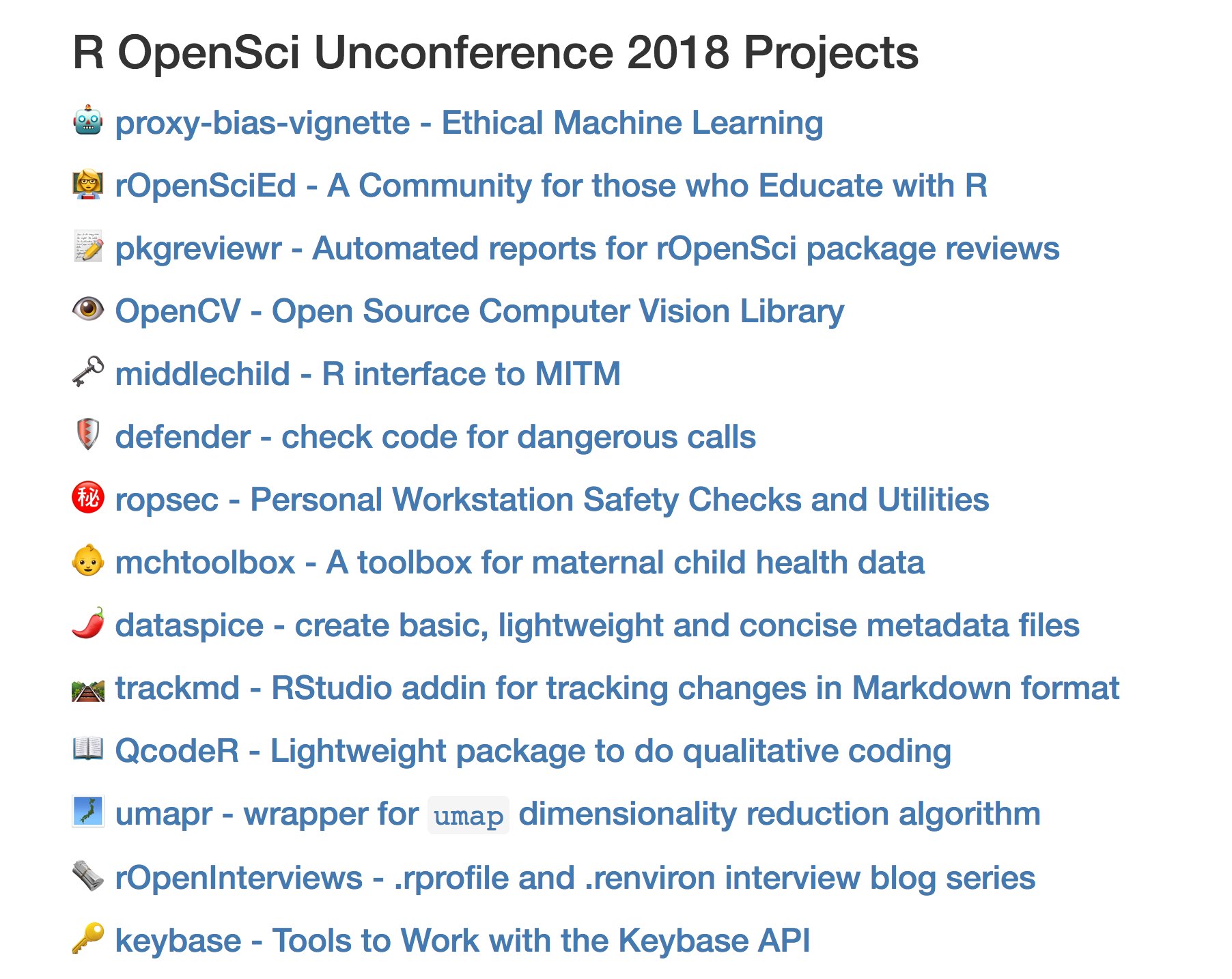Last week I had the opportunity to attend rOpenSci #runconf18. It was a remarkable event, in which ~60 diverse people gathered to work on projects related to open data, package development, data visualization, reproducibility, education and more.
But before talking about the unconf details, let me tell you my story with rOpenSci!
I don’t remember exactly the first time I heard about rOpenSci, but I think it was around two years ago. So last year I heared about the unconf and I was really excited about the idea. I thought about nominating myself but I wasn’t sure whether I would fit with all those developers and scientists. I felt they were more experienced and I saw a huge gap between our levels. In May 2017, I attended London R meetup, where Karthik Ram was giving a talk, and I knew some more info about rOpenSci. Later on, I followed more news about rOpenSci packages, and sometimes I stumbled upon useful ones for my daily work like solrium, elastic or something like skimr, which I knew later that its birth was in runconf17!
This was how I got to know more about rOpenSci and their mission, then came the nomination time for runconf18!
I opened the application several times, hesitating because I felt that my chances were already low, but Maëlle Salmon encouraged me to give it a try, and it worked!
Once they announced the attendees, Stefanie Butland, rOpenSci Community Manager, followed up on the tiniest details to make sure everyone was ready to attend, informed of the process and open to share any concerns. besides my normal anxiety, I had the fear of being on a lower level compared to others, and she assured us that almost 30 of the attendees had this feeling. I also was not sure how things would go on the two days, but she explained to me and to others more through a pre-unconf call. I imagine this was a huge effort from her which contributed to the success of the unconf.
So what about the unconf days?
The unconf discussions usually start before the conference through issues opened on Github where people propose ideas and refine them. On the first day the attendees vote on the ideas they are interested to work on and form groups.
I worked with Noam Ross, Sam Albers, Joyce Robbins, Mauro Lepore and Leonardo Collado-Torres on adding some functionalities to pkgreviewr and create automated reports for rOpenSci package reviews. I will write later more details about the project itself but the collaboration experience itself was really good. I have to say that I am used to work alone for big chunks of time to focus while coding, so it took me a couple of hours on the first day to be on track with the team. But the group attitude itself helped a lot, because Noam tried to make sure everyone is participating, Sam was encouraging me to push my small edits, Joyce, Mauro and Leo were sharing what they were working on. So on the second day, I was even more comfortable.
The other good things were:
-
Stefanie Butland and rOpenSci people organized everything to make sure everyone is feeling comfortable.
-
Groups were formed smoothly and each one found something to work on
-
Things were flexible, so people could move or switch groups during the 1st or 2nd day
-
We had an open space where you could interact with other groups and ask for help. So for instance when I got weird git problems I went to Jenny Bryan :). Many others were offering their help throughout the two days.
-
The attendees were from different backgrounds, so one could find out about more research areas or applications through the discussions.
And I have to say that part of what rOpenSci does is providing different forms of support or sponsorship, like what Emily Robinson mentioned in her post The Importance Of Sponsorship where she defined sponsorship as “giving people opportunities, whether by funding them, advocating for their promotion, introducing them to important people, or making sure they get assigned to the types of challenging projects that can help them grow”.
So that was a brief about the #runconf18 experience, which I definitely would like to try again. And if you are interested to know more about what all the groups worked on, you can find R OpenSci Unconference 2018 Projects Links curated by Sean Kross.
